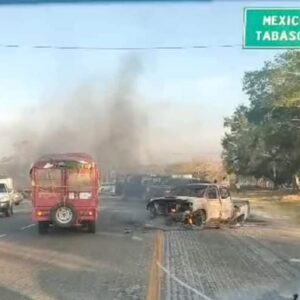
Raúl Zibechi
In the website pelotadetrapo.org.ar (18/3/24), the investigative journalist Carlos del Frade argues in an article entitled “El Experimento Rosarino (The Rosarino Experiment)”: “To annihilate drug trafficking means to end with 30 percent of the international, regional and national financial system.”
“To annihilate drug trafficking means eliminating one of the main arteries of the capitalist system and they will not do it. The only thing they are looking for is to generate social control over the final links in the commercialization of this multinational and para-state business,” Del Frade continues, while stressing that militarization is an experiment “of social control to guarantee the looting.”
So far his analysis is very similar to what has been done in other cases, such as Colombia, Mexico and Central American countries.
The most interesting thing emerges from a previous article, and from his books, where he provides concrete data on how the narco emerged in Rosario, in a text entitled “El Origen del Poder Narco en Santa Fe (The Origin of Narco Power in Santa Fe)” (pelotadetrapo.org.ar, 5/1/15). Del Frade says that “drug trafficking began as a para-state business of the Argentine dictatorship.”
In fact, the statement of a former member of the Argentine Army Intelligence Service, issued in Brazil in 2009, details cocaine shipments since 1978 through agreements between the dictatorships of Jorge Rafael Videla and Bolivia’s Hugo Banzer.
These “businesses” were continued by the narco-dictatorship of Luis García Meza (1980-81), “under the protection of the CIA and the consent of the US government,” taking advantage of the free zone that had been granted to Bolivia in the port of Rosario.
It should be recalled that the Argentine army participated in the coup d’état that brought García Meza to power, through the Intelligence Battalion 601, and that during his brief administration there were 500 victims of forced disappearances, murders and torture, and more than 4 thousand detainees.
Today it can be said that the serious problems suffered by the city of Rosario (which, by the way, many cities of the continent are experiencing), are linked to the origin of drug trafficking in the period of state terrorism half a century ago. This explains, according to Del Frade, the existence of so much “accumulated impunity” that for some years has been exploding and affecting, mainly, the popular sectors.
The important thing about the case of Rosario, and Bolivia, is that it puts in black and white the role of military and police institutions in the expansion of drug trafficking and the role played by military dictatorships. From this experience, very similar to what is happening throughout Latin America, some lessons can be deduced that facilitate the understanding of the phenomenon.
The first is that the narco is a product of the State, of its institutions and above all of the armed apparatus. It is not that they are corrupt, which they obviously are, but that they reason with the capitalist logic of accumulation by dispossession and enrichment through violence. Nor can it be said that those involved with the drug trade are just a handful of “bad apples,” but instead the armed institutions, as such, are part of the business.
We are, therefore, facing a structural issue. In the same way that the Iran-Contra scandal (the use of drug trafficking to finance armed groups created and organized by the United States, such as the Nicaraguan Contra) was not an aberration committed by high officials of Ronald Reagan’s administration, but a common practice used in all its interventions, from Vietnam to Afghanistan, but also to combat internal dissidence, such as the Black Panthers party.
The second lesson is that drug trafficking is a structural mode of capitalism, which uses the State for its expansion. Thus, it can be understood that it is absurd to use the same forces that promote drug trafficking, that live from it and protect it, to fight it. It would be necessary, in each country, to investigate how much a police commissioner earns from the salary provided by the State and how much he earns for protecting drug traffickers. The difference can be abysmal.
The third is that the political power is limited to fighting the lower links of the business, because for the bourgeoisies there are no Bukeles, as Del Frade reminds us. Here the victims are the poor youths, either because they are recruited as “little soldiers” of the narco, and discarded at any moment, or because they are extorted by the local narco-police gangs, murdered or negotiated as prostitutes or hired assassins.
I think it is time we stop believing that political power can do anything against organized crime.
The narco is at the core of the system.
Original text published in La Jornada on March 22, 2024.
Translation by Schools for Chiapas.
